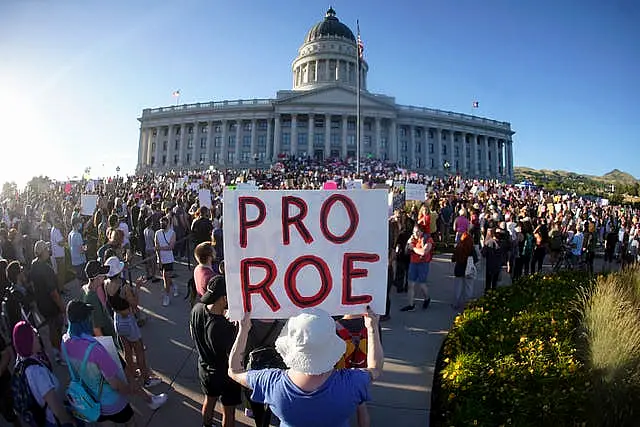Wyoming Governor Mark Gordon has signed into law the US’s first explicit ban on abortion pills since the US Supreme Court overturned Roe v. Wade last summer.
Mr Gordon, a Republican, signed the Bill on Friday night while allowing a separate measure restricting abortion to become law without his signature.
The pills are already banned in 13 states that have blanket bans on all forms of abortion, and 15 states already have limited access to abortion pills. Until now, however, no state had passed a law specifically prohibiting such pills, according to the Guttmacher Institute.
A group seeking to open an abortion and women’s health clinic in Casper said it was evaluating legal options.
“We are dismayed and outraged that these laws would eradicate access to basic health care, including safe, effective medication abortion,” Wellspring Health Access president Julie Burkhart said in a statement.
The clinic, which a firebombing prevented from opening last year, is one of two nonprofit organisation suing to block an earlier Wyoming abortion ban. No arrests have been made, and organisers say the clinic is tentatively scheduled to open in April, depending on abortion’s legal status in Wyoming then.

The Republican governor’s decision on the two measures comes after the issue of access to abortion pills took centre stage this week in a Texas court. A federal judge there raised questions about a Christian group’s effort to overturn the decades-old US approval of a leading abortion drug, mifepristone.
Medication abortions became the preferred method for ending pregnancy in the US even before the Supreme Court overturned Roe v. Wade, the ruling that protected the right to abortion for nearly five decades. A two-pill combination of mifepristone and another drug is the most common form of abortion in the US.
Wyoming’s ban on abortion pills would take effect in July, pending any legal action that could potentially delay that. The implementation date of the sweeping legislation banning all abortions that Mr Gordon allowed to go into law is not specified in the Bill.
With the earlier ban tied up in court, abortion currently remains legal in the state up to viability, or when the foetus could survive outside the womb.
In a statement, Mr Gordon expressed concern that the latter law, dubbed the Life is a Human Right Act, would result in a lawsuit that will “delay any resolution to the constitutionality of the abortion ban in Wyoming”.
He noted that earlier in the day, plaintiffs in an ongoing lawsuit filed a challenge to the new law in the event he did not issue a veto.
“I believe this question needs to be decided as soon as possible so that the issue of abortion in Wyoming can be finally resolved, and that is best done with a vote of the people,” Mr Gordon said in a statement.
In a statement, Wyoming ACLU advocacy director Antonio Serrano criticised Mr Gordon’s decision to sign the ban on abortion pills.
“A person’s health, not politics, should guide important medical decisions — including the decision to have an abortion,” Mr Serrano said.
Of the 15 states that have limited access to the pills, six require an in-person doctor visit. Those laws could withstand court challenges; states have long had authority over how doctors, pharmacists and other providers practise medicine.
States also set the rules for telemedicine consultations used to prescribe medications. Generally, that means health providers in states with restrictions on abortion pills could face penalties, such as fines or licence suspension, for trying to send pills through the mail.
Women have already been travelling across state lines to places where abortion pill access is easier. That trend is expected to increase.
Since the reversal of Roe v. Wade in June, abortion restrictions have been up to states, and the landscape has shifted quickly. Thirteen states now enforce bans on abortion at any point in pregnancy, and another, Georgia, bans it once cardiac activity can be detected, or at about six weeks’ gestation.
Courts have put on hold enforcement of abortion bans or deep restrictions in Arizona, Indiana, Montana, Ohio, South Carolina, Utah and Wyoming. Idaho courts have forced the state to allow abortions during medical emergencies.







